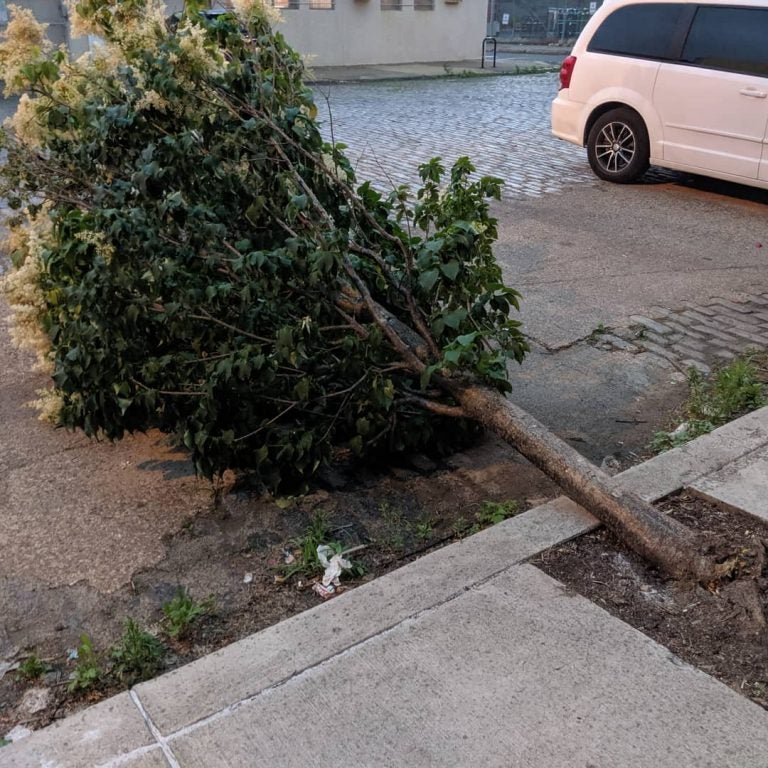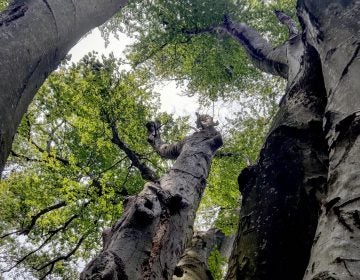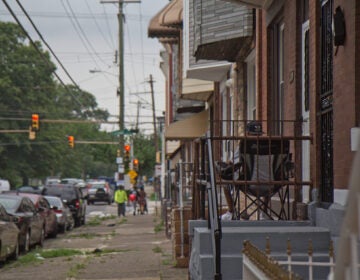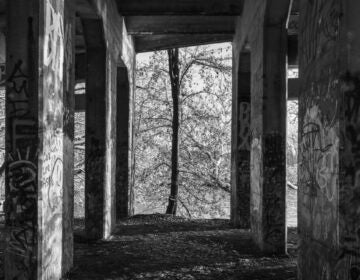I love trees, but please don’t plant one unless you can take care of it
If we want to work towards creating and sustaining an effective canopy, we need a cultural shift to prioritize the life-long maintenance of trees over simply planting them.

A tree down in East Kensington. (Courtesy of Philly Tree People)
Sixteen hundred trees make an aesthetic impact on the streets of Kensington, but it’s not just about looks. Education on proper care and continued maintenance of our struggling young trees is what will make the biggest long-term impact on the health and sustainability of our urban forest.
For the past 14 years, I’ve dedicated myself to this work, but it wasn’t until I moved to Philly in 2005 that I realized that there was a tree discrepancy.
Growing up in West Chester, I was surrounded by nature. I was taught to recycle, compost and conserve—to care for and enjoy the outdoors. I learned from my father who ran a landscaping business and a Christmas tree nursery. It was a lifestyle that prioritized living simply and respecting mother nature.
When I moved to Kensington, the culture shock of being in an urban environment was overwhelming, but I did my best to create my own personal oasis in the form of a backyard garden. The desire to beautify the urban environment spilled out onto my block caring for empty lots and planting flowers in old tree pits along the sidewalks.
I quickly became involved with my local civic association, meeting like-minded neighbors who spent their weekends hosting clean-ups and advocating for open green spaces. I was taken back to one hot summer day when I dragged myself home from the El and noticed a dramatic difference between blocks that were lined with trees and those that were lacking. The streets that had canopy were far cooler than those without and because of the plethora of empty lots in Kensington, that meant that many streets were barren.
Something needed to be done.
I attended the Pennsylvania Horticultural Society’s Tree Tenders training with my neighbor Nykia Perez, and that’s where we met Dina Richman. Together, we formed Philly Tree People (PTP), a not-for-profit organization whose mission is to increase the tree canopy throughout Kensington. We partner with the city of Philadelphia’s plan towards achieving 30% canopy cover by 2025.
PTP works with PHS, Parks & Recreation and property owners to get more trees planted in our neighborhood. We educate people about tree health, host events to teach people how to properly maintain and prune their trees to increase their life expectancy.
Beyond planting trees
Philly Tree People aims to educate everyday Philadelphians about the importance of greening our urban environment.
Planting trees not only help reduce the “heat island effect,” but also decreases air pollution and overall crime, it also increases natural habitats for wildlife and property value in addition to sequestering stormwater run-off.
It increases the quality of life.
Our youngest street trees are the most vulnerable in the first two years of planting. They must receive 15-20 gallons of water a week until the ground freezes and again in thaw, for at least two years. They should be mulched to prohibit weed growth in the pit, to retain moisture, and to add natural nutrients. Compacted soil must be cultivated on an annual basis for the life of the tree to allow for aeration and rainwater to nourish the root system. Dead, damaged, and diseased branches must be properly pruned so the tree can put its energy toward healthy root and branch growth. As the tree grows, proper pruning will facilitate leader dominance, pedestrian and vehicle clearance, and it will curb possible natural branch failure.
PTP shares information with property owners on how to properly care for their tree, however, our data collection shows that far too often they do not follow through.
Teaching a new generation
As an educator and community activist, I recognize the importance of passing on this information and these skills to the next generation. In 2017, I pushed our organization to implement another multifaceted solution when it comes to tree care.
We launched a successful pilot of a Kensington Green Corps program based off of U.C. Green’s Green Corp in West Philadelphia which set the pace for building a solid partnership with PHS and seeking funding for the operation.
Green Corps aims to employ local work-ready high school students, train them in tree tending, and give them the opportunity to utilize their new skills to care for many of our youngest street trees over a six-week period. Our goal is to provide environmental education and civic engagement through paid green job skills training for youth living and/or attending school in the Kensington area in order to make a larger impact on community education while increasing the care of our youngest, most fragile trees.
As we move forward our goals are to expand the amount of youth employed, increase their exposure and opportunities, and then consult with other Tree Tender groups throughout the city to encourage them to start their own.
What’s next
Nature provides for itself, so in the wood, a tree is naturally nourished, however, in our urban environment, that’s not the case.
When a tree is planted in an urban setting, it’s actually the beginning of a life-long process that requires maintenance and care. In Philadelphia, there are a lot of great programs to encourage people to greenify their neighborhoods, however, there’s very little actualization when it comes to long term maintenance plans.
You can’t just plant a street tree and then walk away. If we want to work towards creating and sustaining an effective canopy, we need a cultural shift to prioritize the life-long maintenance of trees over simply planting them.
WHYY is your source for fact-based, in-depth journalism and information. As a nonprofit organization, we rely on financial support from readers like you. Please give today.







